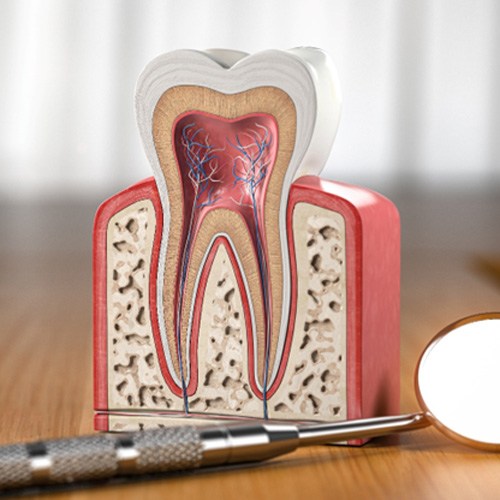

Some patients are wary of the idea of root canal therapy, thinking it to be extremely painful compared to other procedures. Not only is this not true, but undergoing the procedure is actually meant to stop your pain. Root canal therapy is often the solution to a toothache caused by an infection, and it lets you save your tooth from being extracted. Looking for relief from your toothache? Call Dr. Nguyen today to see if root canal therapy in Midlothian, TX is the answer.


The most well-known symptom of a severely decayed or damaged tooth is pain. For some patients, that looks like discomfort when biting down. For others, it’s a sharp, stabbing pain that comes and goes. It’s important to note, however, that this is far from the only warning sign that root canal treatment is needed. We also recommend keeping an eye out for a pimple-like bump on your gums, dark discoloration on the tooth in question, bleeding gums, and other abnormal symptoms. If any of these arise, then make scheduling an appointment with our Midlothian emergency dentist a top priority.

After numbing your mouth and using an appropriate type of sedation to put you into a relaxed state, we’ll create a small hole in the tooth. This gives us access to the pulp chamber where the infection has taken root. The pulp itself will be entirely removed, and the inside of the tooth will be thoroughly cleaned to get rid of any bacteria that might have been left behind. Then, we’ll simply fill the tooth with a biocompatible material, reseal it, and place a crown in order to protect it.

It’s rare for patients to hear about all of the benefits of root canal treatment. But make no mistake – there are several noteworthy ones! Perhaps the most important is that this restorative service can eliminate the infection while saving your tooth. Furthermore, the procedure is completely painless and has an extremely high success rate. Lastly, the restoration placed over the treated tooth or teeth will be crafted from lifelike dental materials that blend in seamlessly with your surrounding teeth. So, not only will you have a pain-free smile again, but no one will be able to tell that you received treatment!

Oftentimes, patients are concerned about two things when it comes to root canal treatment: pain and price. Don’t worry – you’ll be comfortable throughout the entire procedure and our Midlothian dental team will help you navigate the financial side of your care as well. In fact, we’ve even dedicated this next section to the factors that affect the price, if dental insurance covers the cost, and more.

In order to determine the price of your root canal treatment, we need to conduct a comprehensive exam when you arrive at our office. Once we determine the location and type of tooth, how complex your case is, and the type of restoration needed to protect your tooth moving forward, we can create your treatment plan and provide you with an estimate of the cost.

Many patients wonder if it’s easier to simply have their tooth removed. The reality is that extractions usually end up costing more than root canal treatment. Furthermore, there’s nothing quite like your natural teeth, which is why we want to save them whenever possible. As always, our Midlothian dental team is here to help you understand all of the treatment options available to you, so don’t hesitate to bring any questions you have to our team.

If you are currently insured, there’s a good chance that your provider will cover a portion of the cost. In other words, it’s worth double-checking the fine print on your plan to find out the answer! Our Midlothian dental team is happy to accept all PPO plans, and we do our best to make the process of utilizing your benefits as headache-free as possible.

If you don’t have dental insurance, don’t worry – there are other ways to make your dental care more affordable. Here are three financial solutions we offer our patients:

The nice thing about a root canal is that it can preserve a tooth that may otherwise need to be extracted. Moreover, it can preserve this tooth for an incredibly long time, and even a lifetime in some cases.
The longevity of a root canaled tooth comes down to several factors, like the extent of damage that the tooth had suffered before the treatment want completed, how long it takes to get your permanent dental crown after the root canal, and how well you follow the aftercare instructions that we provide to you.
Root canals have a reputation for being uncomfortable, but the fact is that modern dentistry has made these treatments completely painless. Local anesthetics are exceedingly powerful, so much so that you’re unlikely to feel anything at all for the duration of the procedure.
After the root canal has been completed, you might feel a little bit tender for a few days, or the area of the gums around the newly placed dental crown may be slightly irritated. This should fade fairly quickly, and over-the-counter pain medicine should be enough to keep you comfortable.
If you find that your discomfort gets worse instead of better, give us a call so that we can ensure that there isn’t any residual infection left over.
Given that root canals are typically done to address bacterial infections in the mouth, you might wonder why a course of antibiotics couldn’t be just as effective. Antibiotics work by moving through the bloodstream, targeting areas of the body where bacterial infection is prevalent. However, antibiotics won’t be able to reach the root pulp via this method, which means that they’re ineffective at dealing with oral infections.
This is why it’s necessary to physically remove infected root pulp if you want to tackle an infection, either via a root canal or a tooth extraction.
In some cases, you might find that a toothache that was once deeply painful has suddenly vanished on its own. While this may seem like a reassuring sign, and you might be tempted to cancel your root canal appointment, this doesn’t necessarily mean that you’re actually in the clear.
The style of infection that necessitates a root canal attacks the root pulp, which contains the nerve tissue that allows you to feel your tooth. If you neglect treatment for long enough, this infection could degrade the root pulp to such an extent that you can no longer feel your tooth at all. You’ll no longer have a toothache, but the infection is worse than ever.
Even if you find that your toothache vanishes, you should still get a root canal. If you don’t, the infection could kill the tooth completely or could spread elsewhere in the mouth.
I Need a Dental Checkup & Cleaning I am Looking for a Dentist for My Child I am Worried About Bleeding Gums I am in Pain or Had an Accident Dentists Make Me Anxious/Nervous/Afraid I Have a Cavity or Broken Tooth I am Missing One or More Teeth I Want to Improve My Smile I Want to Straighten My Smile View Our Services